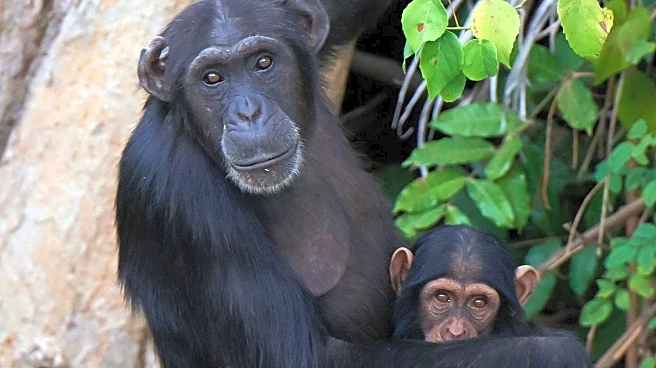What's Happening?
Jane Goodall, the renowned British ethologist and primatologist, has passed away at the age of 91. Goodall was celebrated for her groundbreaking work with chimpanzees in Tanzania's Gombe Stream National Park, where she discovered that chimpanzees make and use tools, a trait previously thought to be unique to humans. Her research revealed that chimpanzees exhibit complex emotions and behaviors similar to humans, including filial love, grief, and even violence. Goodall's approach, which included naming her chimpanzee subjects, challenged the male-dominated scientific community of the 1960s and paved the way for future female primatologists. Her work not only advanced scientific understanding but also led to the establishment of the Jane Goodall Institute, which advocates for the conservation of great apes and supports sustainable development initiatives.
Why It's Important?
Jane Goodall's work has had a profound impact on both science and conservation efforts. By demonstrating that chimpanzees share behavioral traits with humans, she challenged the scientific community to reconsider the boundaries between humans and other primates. This has influenced research in anthropology, psychology, and biology. Furthermore, her advocacy for chimpanzee conservation has raised global awareness about the threats facing these primates, such as habitat destruction and illegal wildlife trade. Goodall's initiatives, like the Jane Goodall Institute and Roots and Shoots, have mobilized efforts worldwide to protect chimpanzees and promote environmental sustainability. Her legacy continues to inspire new generations to engage in conservation and scientific research.
What's Next?
Following Jane Goodall's passing, her institute and other conservation organizations are likely to continue her mission of protecting chimpanzees and their habitats. There may be renewed interest in her work and its implications for understanding human evolution and behavior. Educational programs inspired by Goodall's research are expected to persist, fostering a deeper appreciation for wildlife conservation among young people globally. Additionally, her life's work may prompt further scientific studies into the emotional and social complexities of primates, potentially leading to new discoveries about the connections between humans and other species.
Beyond the Headlines
Jane Goodall's approach to primatology, which involved personalizing her chimpanzee subjects, has sparked discussions about the ethical dimensions of scientific research. Her work has challenged traditional scientific methods and encouraged a more empathetic approach to studying animals. This shift has influenced not only primatology but also broader scientific practices, promoting a more holistic understanding of animal behavior. Goodall's emphasis on sustainable development and conservation has also highlighted the interconnectedness of human and environmental health, underscoring the importance of ethical stewardship of natural resources.










